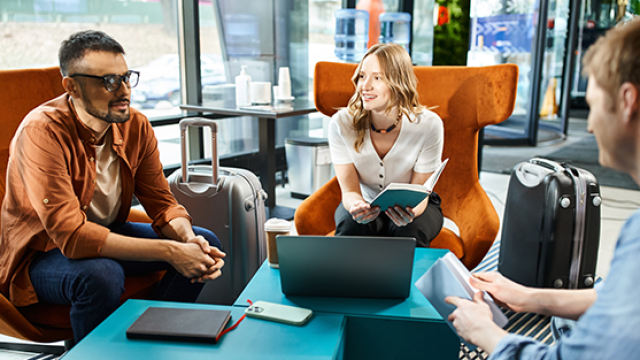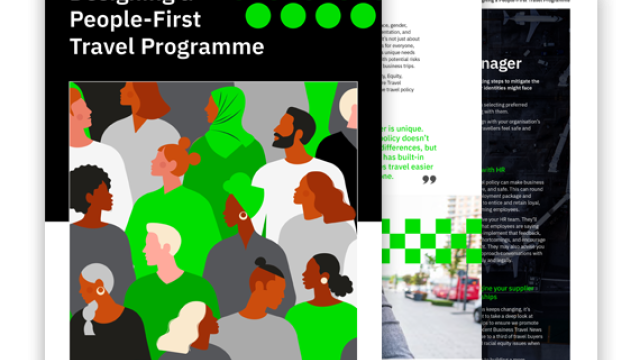Designing an LGBTQ+ inclusive travel programme
Webinar, panellist Q&A + resource list
If you are thinking about how to support LGBTQ+ business travellers, this page is full of resources to help.
- Watch a webinar of corporate travel experts sharing safety tips, helpful resources and expert commentary on the challenges facing this community.
- Follow up questions from the webinar.
- List of useful resources that were discussed.
Questions answered post-webinar
Q: Where can you find the list of countries that are unsafe for or outlaw LGBTQ+ people?
A: The International LGBTQ+ Travel Association (IGLTA) has created insightful online guides for LGBTQ+ safety, trans safety, marriage equality, and HIV travel. Many government organisations have pages of resources, such as "Travel and your sexual orientation, gender identity, gender expression and sex characteristics" on the Canadian government website.
Q: How should we approach LGBTQ+ people who use hybrid pronouns such as she/they?
A: Just ask! Some people might use one set of pronouns in certain contexts, but not others. Some people might be more comfortable with alternating between pronouns. Others might wear pins or bracelets to indicate which set of pronouns they currently use. As with everyone, it's best not to assume. Rather, simply offer your own pronouns and ask how you can respectfully refer to the person.
In the context of booking travel, try not to limit travellers to selecting only one set of pronouns when building their profile. Keep in mind that it may be best practice for people to stick to one set of pronouns on their bookings and travel documents for a smooth experience.
Essential resources for organisations who want to be more inclusive of their LGBTQ+ travellers
- Equaldex is a crowd-sourced knowledge base of LGBTQ+ rights by country and region
- International Lesbian, Gay, Bisexual, Trans, and Intersex Association (ILGA) publishes an annual world report and a map on legislation that criminalises or protects people on the basis of their sexual orientation or recognising their relationships
- The Global Divide on Homosexuality highlights countries' cultural attitudes toward homosexuality
- OutRight Action International also provides reports of human rights violations specific to LGBTQ+ communities
- Amnesty International publishes a report on the state of the world's human rights
- The U.S. State Department also publishes annual human rights reports, which include acts of violence and discrimination based on gender identity and sexual orientation
- ManAboutWorld, a digital magazine for LGBTQ+ travellers, has an LGBTQ Guide for Travel Safety, which provides advice for transgender travellers
- For U.S. nationals, the U.S. State Department Bureau of Consular Affairs provides information on passport gender designation changes and name changes
- The following resource is specific to the U.S. and may not apply abroad, where procedures may vary and/or be inconsistent; however, they prepare you for departure from a U.S. airport:
- The National Center for Transgender Equality provides information on airport security and TSA procedure
For guidance on how to support LGBTQ+ employees, check out these pieces from Risk Management Magazine and the Risk Management Monitor:
- Beyond Pride: Building Strong Diversity and Inclusion Programmes
- The LGBT Travel Risk Dilemma
- Engaging Employees in Their Own Duty of Care
Here are more guides for building a good travel risk management programme:
Further learning
- Out & Equal – the premier organisation working exclusively on LGBTQ+ workplace equality. Through their worldwide programmes, Fortune 500 partnerships and their annual Workplace Summit conference, they help LGBTQ+ people thrive and support organisations creating a culture of belonging for all
- All-In with Google – LGBTQ+ people have been historically excluded from marketing creative, most notably in the media's portrayal of LGBTQ+ women, people of colour (especially women of colour), trans and gender expansive people, people with disabilities, and older people. Built with input from community partners, these U.S.-focused insights are a starting reference to help you create marketing that positively and authentically represents LGBTQ+ people – both inside and outside of Pride Month campaigns
- Pronouns.org – a practical resource dedicated to the empowering and inclusive use of personal pronouns in the English language. This website will help you understand why and how to use the pronouns someone goes by
- PFLAG – Founded in 1973, PFLAG is the first and largest organisation dedicated to supporting, educating, and advocating for LGBTQ+ people and their families. PFLAG’s network of hundreds of chapters and more than 325,000 members and supporters works to create a caring, just, and affirming world for LGBTQ+ people and those who love them
- IGLTA – Founded in 1983, IGLTA is the world's leading network of LGBTQ+ welcoming tourism businesses. They provide free travel resources and information while continuously working to promote equality and safety within LGBTQ+ tourism worldwide. IGLTA's members include LGBTQ+ friendly accommodations, transport, destinations, service providers, travel agents, tour operators, events and travel media located in over 80 countries


